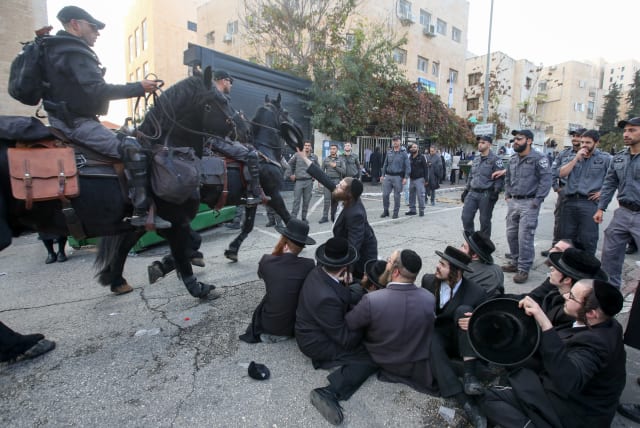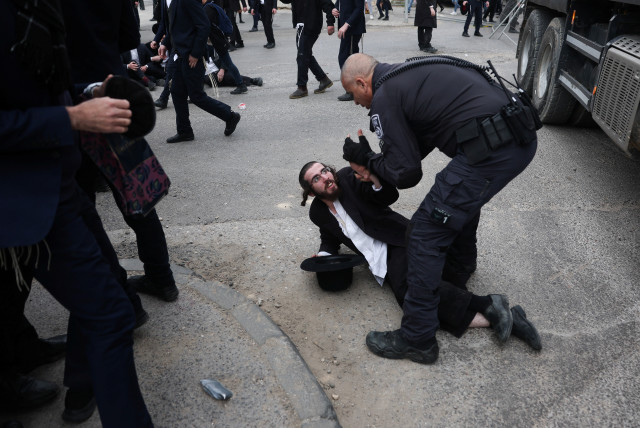High Court challenges gov't Haredi draft policy with conditional orders

Movement for Quality of Government in Israel chairman Dr. Eliad Shraga says the underlying issue at hand is one of equality.
The High Court of Justice issued a series of conditional orders that threatened to upend the government’s policies on drafting ultra-Orthodox (haredi) religious studies students to the IDF on Monday evening, after hearing two petitions earlier in the day.
The orders are as follows:
• The government must issue a defense by March 24 against the nullification of a cabinet administrative decision from June, in which the Defense Ministry was told not to enlist yeshiva students until it had passed a new law by March 31.
• On March 24, the government must explain why it did not recruit yeshiva students for military service. It was bound to do so by a law, the amended version of which expired on June 1, a law that offered exemptions for certain students. The law, which passed originally in 2014, was struck down as unconstitutional in 2017, but then given repeated extensions so that the government could find another solution.
• By March 31, the government must explain why, since June, the Education Ministry has continued to fund Torah institutions with stipends for students whose military service was not legally deferred.
One of the petitioner’s requests was for the High Court to issue a conditional order to advance recruitment dates for yeshiva students and preparatory programs. This was rejected by the Court later on Monday evening because there is already a pending petition on the subject.
The Movement for Quality Government in Israel (MQG), one of the main petitioners, called the conditional orders a dramatic and important step “on the way to full equality in conscription.
“Things will not remain as they are. Discrimination between different parts of society cannot continue. We hope that at the end of the month, a new era will begin of sharing the burden equally – including haredi yeshiva students,” said the group.
MQG chairman Dr. Eliad Shraga argued on Monday morning that the cabinet had no legal authority to decide to delay enlistment until a law was passed and that the decision was influenced by outside interests.
Shraga and the other petitioners invoked the 1998 Rubenstein ruling, which held that Section 36 of the service law could not exempt a broad segment of the population from conscription by general administrative decision alone – that such a decision was only possible through the legislative branch.
The State Attorney’s Office representative Avi Milikovsky said that the authority for the cabinet’s decision didn’t stem from the government to begin with, but rather the law. He said that the Attorney-General’s Office approved a delay until the end of March and under Section 20 of the Service Law – which holds that a person with their service deferred can be enlisted within 12 months after the period of delay. The government could wait until the end of that period to enlist those with deferment.
Brothers in Arms attorney Tommy Manor denied that Section 20 gave positive authority to wait until the end of the period, but serves as a limit to the army, dictating when it could and couldn’t enlist those with deferment. He also contended that the provision doesn’t provide authority for a blanket delay for a group, but for individual cases.
Equality as an underlying issue
The underlying issue at hand was one of equality, said Shraga. A democratic state can’t differentiate between citizens where one demographic group had to enlist and another didn’t.
“In our distorted democracy, there are citizens with only responsibilities like Druze and Circassians, citizens with rights and responsibilities like the majority of the public enlisting for military service, and a group with only rights – who don’t need to pay taxes or have required studies – the yeshiva students who are exempt from all obligations,” said Shraga.
Thousands of families had loved ones who were killed and wounded in battle, said Shraga, yet meanwhile there were “thousands not entering under the stretcher,” a military idiom for sharing a burden. He said that there were “stories” about how thousands of haredi Jews were enlisting, but argued that they were minimal, misleading and didn’t address the scope of the issue.
The military had an immediate need for manpower, Shraga said, missing divisions it needed for the war in Gaza against Hamas.
“It’s not clear to me why this petition wasn’t accepted in September and they weren’t enlisted in October,” when the Hamas massacre occurred, said Shraga. “There are 40,000 people each year not getting their first orders.”
Milikovsky said it was because of the current war that deferment was needed since the situation was so chaotic. This meant they needed until after the government implemented a solution – June 30.
Shmuel Horwitz, an attorney representing the Be’er Yaakov Yeshiva Union, explained that because of the war, there was a unity government. This, he argued, is a different one than the one that made the decision and requested more time. Horwitz also said that the court shouldn’t be interfering with government operations during wartime.
Attorney Dafna Holz-Lechner, representing individual petitioners, argued that it was unacceptable for there to be requests for delays so that one could avoid fighting in a specific war.
She received two rounds of applause from the courtroom when she reminded it that soldiers were fighting as they spoke and that if even only 1,000 haredi Jews could be enlisted, then it should start with that. Acting High Court President Uzi Vogelman decried the applause, called for decorum, and warned that if such displays occurred again it would be necessary to remove audience members.
Shraga objected that they had been working on the issue for 25 years and that with the current trajectory “We are going nowhere....We’re afraid that we’re going to go back to the same situation.” He noted that they had already gone through debates on six petitions and two canceled laws.
Holz-Lechner said there was a concrete strategy by the government to continue delaying a decision. She said that the government realized in June it couldn’t provide exemptions and deferments through law, so it tried to go around the Court and operate through administrative decisions.
She said that while the government protected itself from petitions by claiming that it was only temporary, that there was an outline for a solution, there was no outline, and when the time came, they would argue that there would be elections. In the meantime, Holz-Lechner said, the delays meant that some were now too old to be drafted.
MQG wanted the court to issue an immediate injunction to the government, not give them another chance to implement further delays by giving them 30 days, which would result in the passing of another faulty law that would require new petitions and more permissions for deferment.
Milikovsky and Horwitz argued that an injunction would impact individuals who were under the impression that they would not be immediately enlisted, and they could be in the middle of academic studies, on a flight abroad, or otherwise indisposed.
A second petition concerned the funding that yeshivas received for students in a state of draft deferral. Ayalon Human Rights Forum representative Moshe Shapira said that people were living in the country benefiting from the security and economic situation provided by the rest.
Shapira said that his son, who died five years ago in service, “wasn’t asked if he wanted to not serve, and instead go learn in university.”
He said the current paradigm was discriminatory to those that did serve, amplified by the government’s funding, millions of shekels for stipends for yeshiva students that were not covered under legal exemptions – that is, paying people to violate the law.
The Civil Democratic Movement’s Gilad Barnea said that these stipends also created a negative incentive to volunteer to enlist. He said that 66,000 students currently had deferments, and another 12,000 would soon be eligible for drafting. He said that about NIS 21 million a month were being given to yeshivas for stipends.
He implored the court to issue a conditional order for these payments to cease since massive delays allowed further budget allocations and lost funds.
Milikovsky didn’t have proper data from the government on funding for yeshiva students with deferrals, which Vogelman said was vital for a decision. One of the conditional orders issued Monday night to the government required it to provide information by March 18 on the number of students who didn’t show up for enlistment due to the government’s June 25 deferral decision.
Jerusalem Post Store
`; document.getElementById("linkPremium").innerHTML = cont; var divWithLink = document.getElementById("premium-link"); if (divWithLink !== null && divWithLink !== 'undefined') { divWithLink.style.border = "solid 1px #cb0f3e"; divWithLink.style.textAlign = "center"; divWithLink.style.marginBottom = "15px"; divWithLink.style.marginTop = "15px"; divWithLink.style.width = "100%"; divWithLink.style.backgroundColor = "#122952"; divWithLink.style.color = "#ffffff"; divWithLink.style.lineHeight = "1.5"; } } (function (v, i) { });

